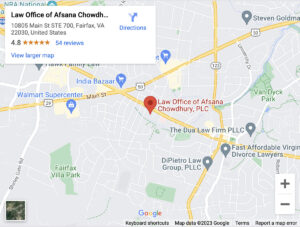
There is a presumption that a child born to a married couple is the husband’s child. However, that might not always be the case. Additionally, there are situations where a child is born out of wedlock, and there is no presumption of paternity.
If you are struggling with a paternity issue in Fairfax, VA, you need an experienced Fairfax paternity lawyer to guide you through the process.
At Chowdhury Divorce Law Group, our law practice focuses on family law matters. Our legal team is comprised of experienced, compassionate, and knowledgeable legal professionals. Our attorneys have more than 11 years of combined experience helping clients with divorce cases and related matters.
Attorney Afsana Chowdhury is an accomplished Fairfax family law attorney. She has earned top ratings on Avvo and Justia. She also received the Avvo Client’s Choice Award. Attorney Chowdhury also appears on the list of Top 10 Attorneys Under 40 by the National Academy of Family Law Attorneys.
Contact Chowdhury Divorce Law Group, to schedule a consultation with our Fairfax paternity attorneys, you can call us at (703) 271-6519.
How Chowdhury Divorce Law Group Can Help You With a Paternity Matter in Fairfax, Virginia

Paternity issues can be complicated family law cases. While it might seem straightforward to perform a DNA test to determine if a man fathered a child, other issues surrounding paternity can be challenging. Once you establish paternity, you need to address issues related to child support, visitation, and child custody.
We treat your case with the attention it deserves. Our top-rated Virginia family law attorneys provide personalized legal services to meet your needs better. We give you support and guidance throughout the paternity process.
We are proud of the client service we provide. Attorney Afsana Chowdhury received recognition for client satisfaction from the American Institute of Family Lawyers.
When you hire our award-winning Fairfax family lawyers, you can expect us to:
- Explain Virginia paternity laws and how they relate to your situation
- Guide you through the process of obtaining your legal rights, including seeking DNA testing to establish paternity
- Work with you to mediate a positive outcome in your case, including resolving issues related to the parenting plan and support payments
- Dispute paternity when you do not believe a child is your child
- Seek paternity for your child so the father is responsible for support
If you are seeking or disputing paternity, you need an attorney with experience and diligence. At Chowdhury Divorce Law Group, our Fairfax paternity lawyers work with you to resolve the matter quickly and efficiently.
Call now for a case evaluation with an experienced paternity attorney in Fairfax, Virginia.
How Do You Establish Paternity in Fairfax, VA?
There are four basic ways to establish paternity in Virginia. They are:
Presumption of Paternity
As mentioned above, if you are married when your child is born, you are presumed to be the father. However, if you are unmarried and living with your partner, you are not presumed to be the father. Therefore, you would want to sign an acknowledgment or a petition for a DNA test to determine paternity.
Voluntary Acknowledgement of Paternity
You and the mother can sign an Acknowledgement of Paternity after the birth of your child. The form must be notarized and filed with the Virginia Department of Health.
Before signing the form, the parties are given a written and oral description of the rights and responsibilities that accompany acknowledging paternity. The description also instructs the parties of the consequences of signing the acknowledgment of paternity. A father has up to 60 days of signing to file a petition with the court to vacate the form.
Adoption
When you adopt a child, you become the legal parent. As a result, a man establishes paternity with proof of adoption. When a child is adopted, the court terminates the legal rights of the birth parents.
DNA Testing
The presumed father and the child undergo DNA testing to determine if the man is the child’s biological father. Reliable genetic tests can accurately determine a child’s biological parents. The courts can order DNA testing to determine whether a man is the father of a child when the parties dispute paternity.
Registering With the Virginia Birth Father Registry
Some paternity cases can take a while to resolve, especially if the court orders DNA testing. While the paternity case is pending before the court, the putative (presumed) father has no legal rights to their child. In these circumstances, they might want to register with the Virginia Birth Father Registry, formerly known as the putative father registry.
Registering does not establish paternity. However, reasons a putative father might want to register include:
- Prevent the adoption of a child without the putative father’s knowledge
- Receive notice if someone tries to terminate parental rights
- Enhance the opportunities for co-parenting
- Receiving notification if the child is placed in foster care
A putative father must register within ten days after the child’s birth for a valid registration. The putative father has up to 60 days after signing the form to petition the court to vacate the acknowledgment.
If you suspect a child is yours but have not established paternity, it is wise to register as the putative father. Undoing adoptions, termination of parental rights, and other court actions after they are closed can be incredibly challenging. It is best to fight these actions while the court is hearing the case, including requesting DNA testing to establish your rights as the child’s legal father.
Benefits of Establishing Paternity for the Father and the Child
You could be cut out of your child’s life if you do not take steps to establish paternity. However, paternity gives you the legal right to petition for custody and visitation. Without evidence to the contrary, you are entitled to see your child and make important decisions for them.
After paternity is established, the father’s name is added to the child’s birth certificate, confirming that the man is the child’s legal father. A legal parent can make decisions for their child regarding issues like education, medical treatment, religious upbringing, and extra-curricular activities. If the child’s mother wants to prevent you from exercising your legal rights, she would need to file a petition with the court seeking full and sole custody of the child.
Establishing paternity also helps a child. First, it gives the father a right to develop a parent-child relationship. Barring reasons why the father could be unfit, it is generally presumed that children benefit from having a relationship with both parents.
A child also has the right to collect disability benefits, Social Security, and veterans benefits if the father becomes disabled or dies. Establishing paternity also gives the child inheritance rights.
Importantly, establishing paternity means the father is legally responsible for providing financial support for the child. If the mother has custody, the legal father may be required to pay child support payments under Virginia’s child support guidelines.
Petitioning the Court for Child Custody and Visitation After Establishing Paternity in Virginia
After a father establishes paternity, he can petition the court for custody and/or visitation with his child. Virginia custody laws require the judge to consider a child’s best interests when deciding custody cases. Therefore, factors judges consider include:
- The age of the child
- The existing relationship between the parent and child
- The physical and mental health of the child
- The inclination of each parent to actively the child’s contact and relationship with the other parent
- The child’s needs, including relationships with siblings and extended family members
- The ability of a parent to cooperate with the other parent when resolving disputes involving their children
- A history of family abuse, sexual abuse, child abuse, or acts of violence
- The roles of each parent in the upbringing and care of the child in the past and moving forward
- The willingness and ability of a parent to continue a close relationship with their child
- A child’s reasonable preference for custody
If a man did not know he was the father and was absent during the child’s life, the court may not change custody. The child’s mother might present evidence from experts that indicates changing custody before the child develops a relationship with the father could harm the child.
Therefore, the court might grant the father legal rights but set up a schedule for visitation so the child can get to know the father. If the child is very young, that might not be necessary.
Each custody case is based on the facts relevant to that case. A father who has recently established paternity can work with an experienced Fairfax child custody lawyer to obtain a child custody agreement that recognizes his rights while protecting the child’s best interests.
Schedule a Consultation With Our Fairfax Paternity Lawyers
Establishing paternity gives you legal rights to your child. It also grants child support and other essential rights for providing for the child’s financial needs.
If you have questions about paternity cases in Virginia, call our family law firm at (703) 420-4939 to schedule a case review with an experienced Fairfax paternity attorney.
Visit Our Family Law Office In Fairfax, VA
Chowdhury Divorce Law Group
10805 Main St STE 700A,
Fairfax, VA 22030
Phone: (703) 271-6519
Business Hours:
Monday: 9:00 AM- 5:00 PM
Tuesday: 9:00 AM- 5:00 PM
Wednesday: 9:00 AM- 5:00 PM
Thursday: 9:00 AM- 5:00 PM
Friday: 9:00 AM- 5:00 PM
Saturday: Closed
Sunday: Closed

Our family law firm in Fairfax, VA, also provides:
- Alimony Lawyer in Fairfax, VA
- Annulment Lawyers in Fairfax, VA
- Child Custody Attorney in Fairfax, VA
- Child Support Attorney in Fairfax, VA
- Contested Divorce Lawyer in Fairfax, VA
- Domestic Violence Lawyers in Fairfax, VA
- Gray Divorce Attorney in Fairfax, VA
- LGBT Divorce Attorneys in Fairfax, VA
- Military Divorce Lawyer in Fairfax, VA
- Modifications of Order Lawyers in Fairfax, VA
- Parental Alienation Attorney in Fairfax, VA
- Separation Agreement Lawyer in Fairfax, VA
- Spousal Support Lawyers in Fairfax, VA
- Uncontested Divorce Attorney in Fairfax, VA


